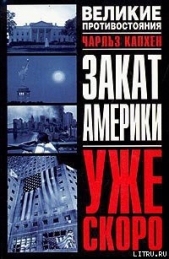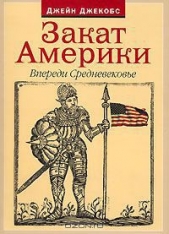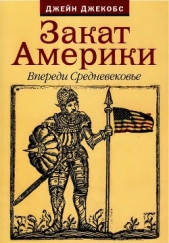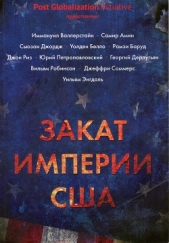Закат Америки. Уже скоро

Закат Америки. Уже скоро читать книгу онлайн
История учит, что великие державы не вечны – рано или поздно любая из них, сколь бы ни была она могущественна, оказывается на грани коллапса и уступает свое место на «мировой шахматной доске» новым амбициозным игрокам. Так было и с первой «евроатлантической» империей – македонским царством Александра Великого, так было и с Римской империей, и с империей Британской, над которой «никогда не заходило солнце». Схожая участь, по мнению Чарльза Капхена, профессора Школы международных отношений при Джорджтаунском университете и директора Европейского отдела в Совете по международным отношениям, ожидает и нынешнего «мирового гегемона» – Соединенные Штаты Америки.
Внимание! Книга может содержать контент только для совершеннолетних. Для несовершеннолетних чтение данного контента СТРОГО ЗАПРЕЩЕНО! Если в книге присутствует наличие пропаганды ЛГБТ и другого, запрещенного контента - просьба написать на почту [email protected] для удаления материала
7. Francis Fukuyama, «The End of History?» National Interest, no. 16 (Summer 1989), p. 3—18; Francis Fukuyama, «The End of History and the Last Man» (New York: Free Press, 1992).
8. John J. Mearsheimer, «Back to the Future: Instability in Europe After the Cold War», International Security, vol. 15, no. 1 (Summer 1990), p. 5—56; John J. Mearsheimer, «Why We Will Soon Miss the Cold War», Atlantic Monthly, vol. 266, no. 2 (August 1990), p. 35—50.
9. Samuel P. Huntington, «The Clash of Civilizations?» Foreign Affairs, vol. 72, no. 3 (Summer 1993); Samuel P. Huntington, «The Clash of Civilizations and the Remaking of World Order» (New York: Simon & Schuster, 1996).
10. Matthew Connelly and Paul Kennedy, «Must It Be the Rest Against the West?» Atlantic Monthly, vol. 274, no. 6 (December 1994), p. 61 —83. Кеннеди также высказал свой взгляд на складывающуюся международную систему в книге «Preparing for the Twenty-first Century» (New York: Random House, 1993).
11. Robert D. Kaplan, «The Coming Anarchy», Atlantic Monthly, vol. 273, no. 2 (February 1994), p. 44—76; Robert D. Kaplan, «The Coming Anarchy: Shattering the Dreams of the Post Cold War» (New York: Random House, 2000).
12. Thomas L. Friedman, «The Lexus and the Olive Tree» (New York: Farrar, Straus & Giroux, 1999).
13: Fukuyama, «The End of History?» p. 4.
14. Fukuyama, «The End of History and the LastMan», p. XVIII.
15. Из современных работ по демократическому миру см.: Michael W. Doyle, «Kant, Liberal Legacies, and Foreign Affairs», Philosophy and Public Affairs, vol. 12, nos. 3 and 4 (Summer and Fall 1983), p. 205—235, p. 323—353; Bruce M. Russett, «Grasping the Democratic Peace: Principles for a Post—Cold War World» (Princeton: Princeton University Press, 1993); «Debating the Democratic Peace», ed. Michael E. Brown, Sean M. Lynn-Jones, and Steven E. Miller (Cambridge, Mass.: MIT Press, 1996); and «Paths to Peace: Is Democracy the Answer?» ed. Miriam Fendius Elman (Cambridge, Mass.: MIT Press, 1997).
16. Fukuyama, «The End of History and the Last Man», p. XX.
17. Ibid., p. 276.
18. Fukuyama, «The End of History?» p. 18.
19. Francis Fukuyama, «SecondThoughts: The Last Man in a Bottle», National Interest, no. 56 (Summer 1999), p. 16—33.
20. Mearsheimer, «Back to the Future», p. 142. Хотя Миршеймер, составляя карту мира после «холодной войны», изначально рассматривал только Европу, впоследствии он включил в рассмотрение и Восточную Азию («The Tragedy of Great Power Politics», New York: Norton, 2001). Он придерживается точки зрения, сформулированной в ранних работах, и предсказывает постепенный вывод американских войск из Европы и Восточной Азии и возвращение в эти регионы геополитического соперничества. Прочие «реалисты», например, Кеннет Уолтц, также рассматривают экономический подъем Японии и Китая как предвестие геополитического соперничества в регионе. «Рано или поздно международный статус государств придет в соответствие с их материальными ресурсами». Kenneth N. Waltz, «The Emerging Structure of International Politics», International Security, vol. 18, no. 2 (Fall 1993), p. 66. См. также Aaron L. Friedberg, «Ripe for Rivalry: Prospects for Peace in a Multipolar Asia», International Security, vol. 18, no. 3 (Winter 1993—1994), p. 5—33.
22.Mearsheimer, «Why We Will Soon Miss the Cold War», p. 36.
23.Mearsheimer, «Back to the Future», p. 147.
24.Mearsheimer, «Why We Will Soon Miss the Cold War», p. 35.
25.Ibid., p. 46.
26.Ibid.
27.Ibid., p. 40.
28.Ibid., p. 42.
29.Ibid., p. 50.
30.Huntington, «The Clash of Civilizations?», p. 24.
31. Huntington, «The Clash of Civilizations and thej Remaking of World Order», p. 41—43.
32. Huntington, «The Clash of Civilizations?», p. 25.
33. Ibid., p. 31.
34. Ibid., p. 22.
35. Ibid., p. 29.
36. Ibid., p. 48.
37. Huntington, «The Clash of Civilizations and the Remaking of World Order», p. 20
38. Huntington, «The Clash of Civilizations?», p. 49. Paul M. Kennedy, «The Rise and Fall of the Great Powers: Economic Change and Military Conflict from 1500 to 2000» (New York: Random House, 1987); Robert D. Kaplan, «Balkan Ghosts: A Journey Through History» (New York: St. Martin's, 1993); and Robert D. Kaplan, «The Ends of the Earth: A Journey at the Dawn of the 21 st Century» (New York: Random House, 1996).
40.Connelly and Kennedy, «Must It Be the Rest Against the West?», p. 62, 69,79.
41.Kennedy, «Preparing for the Twenty-first Century», p. 331.
42.Robert D. Kaplan, «The Coming Anarchy», p. xiii.
43.Ibid., p. 24.
44.Connelly and Kennedy, «Must It Be the Rest Against the West?», p. 62.
45.Robert S. Chase, Emily B. Hill, and Paul Kennedy, «Pivotal States and U.S. Strategy», Foreign Affairs, vol. 75, no. 1 (January—February 1996), p. 63.
46.Kaplan, «The Coming Anarchy», p. 7, 19.
47.Connelly and Kennedy, «Must It Be the Rest Against the West?», p. 79.
48.Kaplan, «The Coming Anarchy», p. 120.
49.Ibid.
50.Ibid., p. 125.
51.Friedman, «The Lexus and the Olive Tree», p. 7—8.
52.Ibid., p. xviii.
53.Ibid., p. 201.
54.Ibid., p. 86.
55.См., for example, Robert O. Keohane, «After Hegemony: Cooperation and Discord in the World Political Economy» (Princeton: Princeton University Press, 1984).
56.См., for example, Thomas Risse-Kappen, «Cooperation Among Democracies: The European Influence on U. S. Foreign Policy» (Princeton: Princeton University Press, 1997).
57.Joseph S. Nye, Jr., «Bound to Lead: The Changing Nature of American Power» (New York: Basic Books, 1990).
58.Friedman, «The Lexus and the Olive Tree», p. 196—198.
59.Ibid., p. 41.
60.Ibid.
61.Ibid., p. 212.
62.Thomas Friedman, «World War III», New York Times, September 13,2001. Rankings based on market capitalization as of March 28, 2002, Financial Times Global 500 Guide, May 8, 2002. Available at: http://specials ft com/spdocs/ FT3BNS7 BW0D.pdf.
64. Jane Perlez, «With Time Short, Albright Stays Aloft», New York Times, July 3, 2000.
65. World Bank, China 2020: Development Challenges in the New Century (Washington, D.C.: World Bank, 1997), p. 103.
66. Senate Resolution 208, November 8, 1999.
67. Henry Kissinger, «U.S. Intervention in Kosovo Is a Mistake», Boston Globe, March 1,1999.
68. Cited in Edmund Andrews, «Bush Angers Europe by Eroding Pact on Warming», New York Times, April 1, 2001.
69. David Sanger, «Bush Flatly States U.S. Will Pull Out of Missile Treaty», New York Times, August 24, 2001.
70. Dana Milbank, «Bush Advocates a Wider NATO», Washington Post, June 16, 2001.
71. «Bush Unpopular in Europe, Seen as Unilateralist», August 15, 2001. Available at: http://people-press org/reports/display php3?ReportID=5. Survey conducted by the International Herald Tribune, the Council on Foreign Relations, and the Pew Research Center for the People and the Press. См. также Adam Clymer, «Surveys Find European Public Critical of Bush Policies», New York Times, August 16, 2001.
72. JohnKifner, «56IslamicNationsAvoidCondemningU.S. Attacks, but Warn on Civilian Casualties», New York Times, October 11,2001.
73. Laurie Goodstein, «Muslim Scholars Back Fight Against Terrorists», New York Times, October 12, 2001.
74. Cm. Stephen M. Walt, «The Origins of Alliances» (Ithaca: Cornell University Press, 1987).
ГЛАВА 3
1. President Calvin Coolidge, State of the Union Address, December 4, 1928, a; cited in John Kenneth Galbraith, «The Great Crash, 1929» (New York: Time Inc., 1961), p. 7.
2. Ibid., p. 26—27, 70.
3. Cited ibid., p. 38.
4. Cited ibid., p. 73.
5. Cited ibid., p. 74.
6. Ibid., p. 80.
7. Piers Brendon, «The Dark Valley: A Panorama of the 1930s» (New York: Knopf, 2000), p. 86.
























